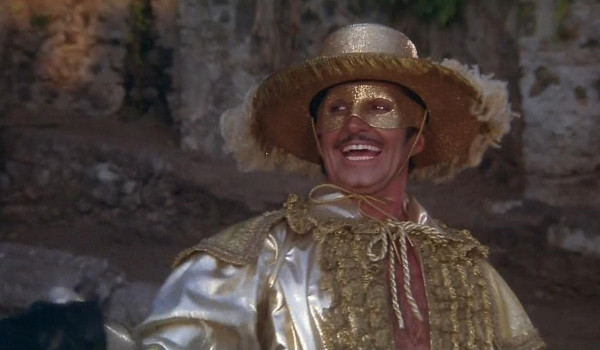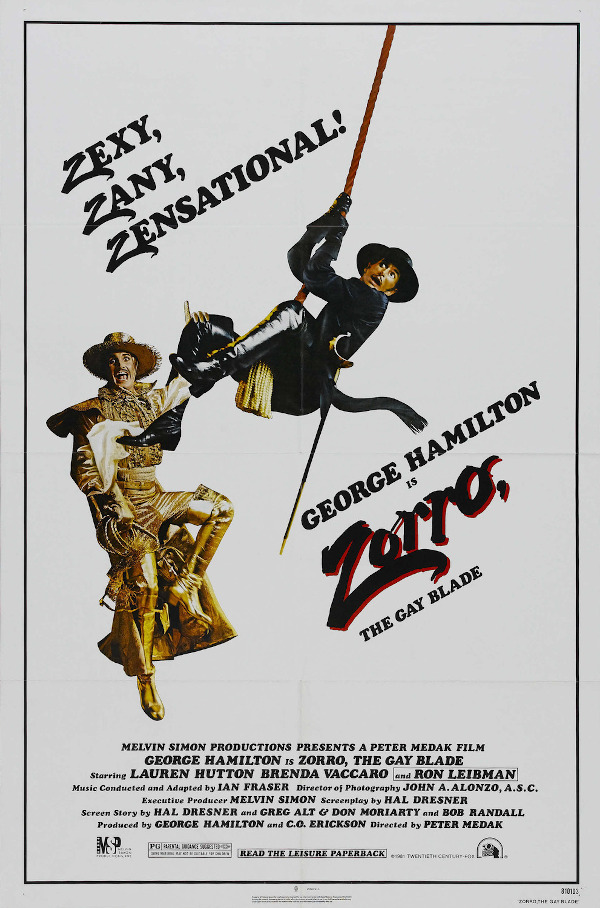- Title: Zorro, the Gay Blade
- IMDb: link

Today’s Throwback Tuesday takes us back to the thrilling days of yesteryear, or 1981 to be exact. A tongue-and-cheek sequel to the popular Zorro franchise in general, and 1940’s The Mark of Zorro in particular, George Hamilton stars in dual roles as both sons of the legendary Zorro (although neither is aware of their father’s vigilante lifestyle prior to his death). Before the end of the movie both Don Diego de la Vega and Bunny Wigglesworth will follow in their father’s footsteps and stand-up for the peoples of 19th Century Los Angeles.
Returning home from his womanizing ways, Don Diego discovers his father has died and an old friend (Ron Leibman) has taken over as Alcalde and is crushing the local population under heavy taxes. After learning of his family tradition, Don Diego will take up the mantle of Zorro.
Celebrating and lampooning Zorro’s history, Zorro, the Gay Blade is terrific fun full of cheesy jokes and references which I loved seeing as a kid (this is, after all, the Zorro of my childhood) and still enjoy to this day. After Don Diego’s injury, his brother returns from the Royal Navy to take on the role of the Zorro with a far more vibrant, whip-wielding, take. Hamilton is enjoyable in both roles (earning a Golden Globe for his performance). The supporting cast includes the nearly always shouting Leibman, Brenda Vaccaro as the Alcalde’s wife, and Lauren Hutton as Zorro’s love interest as the political activist from Boston, wealthy enough to have three names.
While admittedly a bit of a guilty pleasure, I’d still argue Zorro, the Gay Blade is a solid and enjoyable film that succeeds (despite all the main roles in the film not being cast by Latinos, although they are represented in the large supporting cast including the various Dons) both as a hero film and as a comedy. The tone of the comedy may be an acquired taste, with several in-jokes and goofy dialogue and one-liners, and you will know by the end of the opening scene whether it works for you. The actors go all-in with their performances leading a memorable entry in the Zorro franchise (despite Disney’s attempt to hide the film which is not available to watch on any streaming platform, including their own, and has long been out of print on DVD).

Aside from the humor, the main sticking point for some is the character of Bunny Wigglesworth. While I doubt the film would be made in the same manner today, and Bunny certainly showcases some typical gay stereotypes, he’s also unquestionably the hero of the film. Playing the role of Zorro far longer than Don Diego, Bunny is the one who really brings Zorro back to the people and, always decked out in vibrant reinterpretations of Zorro’s black costume, does it with style. For a film in 1981 to cast a gay character as its main hero, and make him brave and more courageous than anyone else in the film, was certainly a bold choice for the time.
For the film’s score, director Peter Medak and the film’s producers decided to adapt existing music from The Adventures of Don Juan which turns out to fit perfectly with the tone of the film. Other fun touches include the use of full-screen cards pointing out important ideas, events, or the lapse of time throughout the film, which work as a nod to Zorro’s appearance in silent films and also provide more humor as the sequences are often used for quick asides or get a bit crazy with alliteration. Having seen the film as a child, I have little doubt my larger appreciation for humor was, at least in part, formed by watching Zorro, the Gay Blade (corny as it might be).
Watch the trailer




